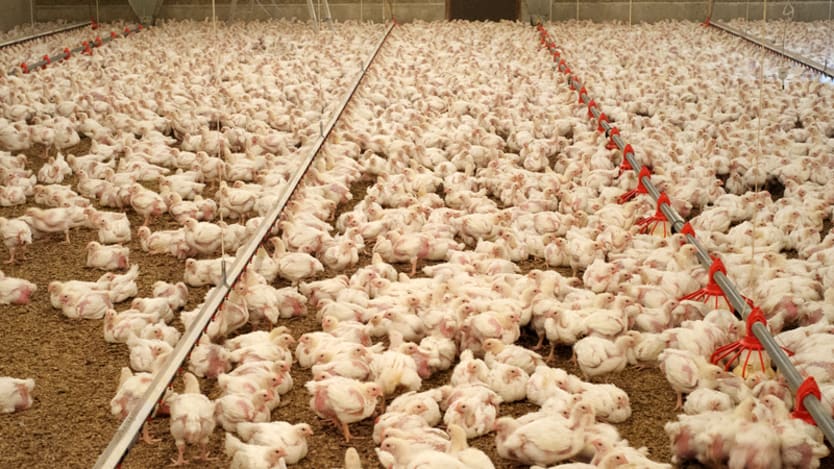
The member states electing the next director-general to the World Health Organization have a tough choice this week to pick between three formidable candidates. Regardless of who they pick, however, we ask that they prioritize an issue that is seldom discussed in the corridors of Geneva’s global health hub. That issue is factory farming.
At last year’s World Health Assembly, Director-General Margaret Chan highlighted three “slow motion” disasters of central importance to global health: Climate change, antibiotic resistance, and the rise of non-communicable diseases. Factory farming is central to all three of these disasters.
In an open letter signed by over 200 of the world’s foremost experts in medicine, public health, biology, environmental science, ethics and moral philosophy, we ask the next director-general of the WHO to acknowledge the harms that factory farming inflicts on global health and to take action to mitigate them. The convergence of experts from different fields, including many that those in the global health field will recognize, reflects the importance of the monumental task ahead of us. The extent to which factory farming is prioritized among a variety of important issues will come down to the next director-general.
What we know as WHO heads into historic election
The World Health Organization is preparing to hold its first ever election to fill the post of director-general. With politicking still going on in earnest behind the scenes, the race is still anyone's to win. Devex lays out what we know so far about the candidates' prospects — and the challenges the eventual winner will face.
For example, the WHO has exerted significant leadership in bringing antibiotic resistance to the front of the global health agenda in recent years, in large part owing to Margaret Chan’s use of her bully pulpit. However, the WHO could do more to strengthen its Global Action Plan on Antimicrobial Resistance, by encouraging member states to ban the indiscriminate use of antibiotics on factory farms. This practice is often used on factory farms with the intention of preventing diseases and speeding up animal growth, but evidence shows that it achieves neither, while drastically worsening antibiotic resistance. The WHO could also work with the Food and Agriculture Organization to articulate specific, verifiable standards for what constitutes legal use of antibiotics on factory farms. Reducing the risk that antibiotic resistance poses to humanity in the 21st century means not only taking the above steps, but recognizing the central role that factory farms play on this issue — over 75 percent of all antibiotics used in the United States and the European Union are used in agriculture.
Climate change depends crucially on getting agriculture — especially how we raise animals for food — right. Raising livestock not only contributes to climate change because it is an inefficient, resource-intensive means of growing food, but also because in many areas it requires deforestation to supply grazing land and grow crop feed. In the Amazon, between 1970 and 2004, 91 percent of cleared land has been converted to cattle ranching. Globally, experts predict that without drastic and urgent changes to our meat consumption, agriculture will consume more than half of our “carbon budget” necessary for keeping global temperature rises under 2 degrees Celsius by 2050. The WHO must ensure that member states account for this externality by removing subsidies and applying relevant fiscal policies to fully account for the societal cost of meat.
The WHO could do more to strengthen its Global Action Plan on Antimicrobial Resistance, by encouraging member states to ban the indiscriminate use of antibiotics on factory farms.
—Factory farming also contributes to the final disaster highlighted by Margaret Chan — the rise of non-communicable diseases, especially in poorer countries. Just last year, the WHO classified processed meat as carcinogenic and red meat as “probably carcinogenic.” The Institute for Health Metrics and Evaluation estimates that diets high in processed and red meat contributed to over half a million human deaths in 2015 — more deaths worldwide than interpersonal violence, and a similar burden in terms of disability adjusted life-years to breast cancer or alcohol use disorders. Adopting sensible policies in member states, such as nutrition standards and education campaigns that discourage high rates of meat consumption, is a step the WHO could encourage. The WHO could even consider encouraging the development of plant-based and other alternatives to meat, many of which have the potential to reduce or eliminate the harms of this industry.
Without these important steps, it is unlikely that the WHO will be able to achieve its full impact on the disasters highlighted by Dr. Chan. As a new director-general takes the helm, we encourage them to consider a set of sensible policies to mitigate the harms that factory farming presents to global health.
Join the Devex community and access more in-depth analysis, breaking news and business advice — and a host of other services — on international development, humanitarian aid and global health.



